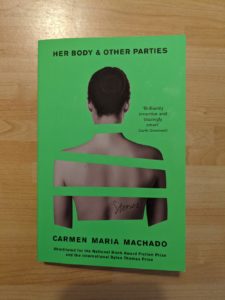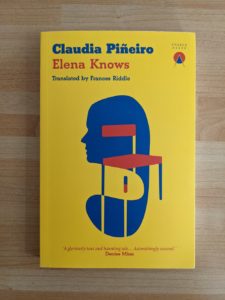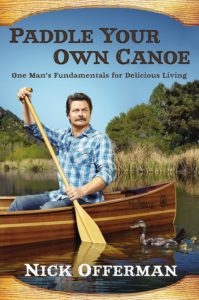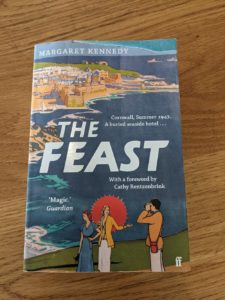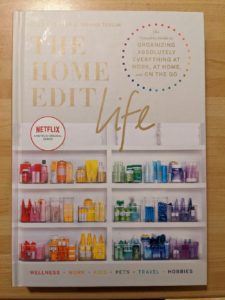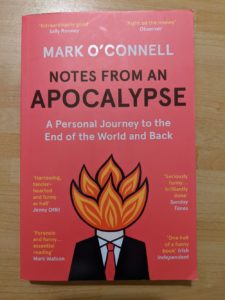 Four Stars
Four Stars
Best for:
Anyone contemplating all the horrors in the world right now.
In a nutshell:
Author O’Connell travels to various parts of the world to examine how people are reacting to various apocalyptic-adjacent events.
Worth quoting:
“Preppers are not preparing for their fears: they are preparing for their fantasies.”
“This was a new entry into the apocalyptic imaginary: bankers and hedge-fund managers, tanned and relaxed, taking the collapse of civilization as an opportunity to spend some time on the links, while a heavily armed private police force roamed the perimeters in search of intruders. All of this was a logical extension of the gated community. It was a logical extension of capitalism itself.”
“What did I really mean by the end of the world, after all, if not the loss of my own position within it?”
Why I chose it:
This was another one recommended to me by a bookseller at my “book spa” day after I said I appreciated dark subject matter. The main line that stands out on the back of the book sets the tone: “Now updated to include the latest apocalypse.” (There is a brief notes section up front discussing the COVID pandemic.)
Review:
O’Connell has written something I thought not possible: a book that explores so much of what is going horribly wrong right now from a disaster standpoint that didn’t make me want to just bury my head under my pillow. Now, it’s not a cheerful book, or even a particularly hopeful one (though he does try to tie his thoughts as the parent of young children to each story, which gives him some hope). It’s deeply disturbing, but also entertaining to read. Given it is non-fiction, that seems like an odd thing to say, but I stand by it.
Each chapter sees O’Connell exploring some fresh hell on earth; more specifically, he looks at how people are addressing these issues. Not from a political or governmental level; he’s looking at the individuals. He explores the ‘prepper’ community, including a place in South Dakota where developers are selling former ammunition bunkers to people who want to set up their own personally protected fallout / bomb / zombie invasion shelters. He looks at the Silicon Valley assholes looking to treat New Zealand as their own colonial retreat (again) for when things get bad for them. He explores the deeply disgusting actions of the Elon Musks of the world who are desperate to escape earth and live out their colonizer fantasies on Mars.
It’s fascinating, really, to explore what seems to tie all these reactions and actions together: white men who have basically given up on earth and any sense of community or society where one looks out for others. Preppers hoarding supplies and guns so they can fight off their neighbors; the Peter Thiels of the world who have amassed loads of wealth who are building literal fortresses in other countries; the Jeff Bezoses of the world, who, having harmed so many of his workers is now feeding his ego by flying a phallus into the upper atmosphere.
This book is about the end times, in the sense that perhaps we are always living in them, to some degree, depending on what our personal life experiences are. Just in the two weeks I’ve been reading this book: hospitals in the US have been overwhelmed by people who are completely unwilling to take even the tiniest actions to protect their neighbors (wear a mask and get a vaccine) but think horse de-wormer is a safe medication; hurricane Ida has swept through Louisiana and led to flash flooding in New Jersey and New York; a giant fire crested the Sierra Nevada mountain range and nearly destroyed Lake Tahoe, one of the most beautiful places on earth; the US left Afghanistan after 20 years of a war that should never have happened, leaving behind so many who helped the US and who are in grave danger. Oh, and Roe vs Wade was overturned in the middle of the night.
Also in this time, I was able to hike along the white cliffs of Dover. I cuddled my cats. I laughed with my partners. People across the country went to see movies. People got married. People still had children. They earned college degrees. They had BBQs with friends. They brought their communities together to help neighbors who have been devastated by all the disasters I listed above, and then some.
This book doesn’t offer suggestions on how to fix the climate emergency, or end capitalism. It’s not a blueprint for how those communities and societies that have treated the earth and its inhabitants so poorly for centuries can reverse course. I honestly don’t know what it is – travelogue? Memoir? A bunch of long-form essays? Whatever it is, I think it was well done.
Recommend to a Friend / Donate it / Toss it:
Recommend to a Friend

